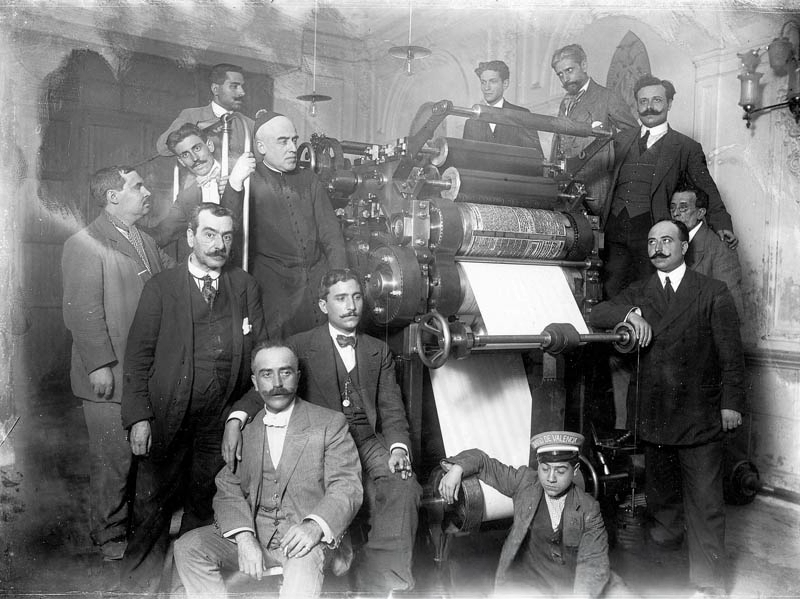Digital Media, Emotions and Telepresence in the Venezuelan Digital Diaspora
DOI:
https://doi.org/10.12795/RIHC.2024.i23.12Keywords:
Digital diaspora, Telepresence, Emotions, Migration, Mobile deviceAbstract
This study examines the impact of digital media, telepresence and emotions in the Venezuelan diaspora, integrating historical elements and theoretical concepts from various disciplines. Such experiences are mediated through digital devices that mitigate separation and uprooting, transforming cultural uses and practices. In this sense, agency artifacts allow the flow of relationships and emotional interactions at a distance. Transforming relationships of intimacy and affection, reconfiguring the place of virtuality through digital devices, reforming the subjectivities of the migrant in the digital diaspora. In this way the notion of home and the place of origin are digitally mediated, transforming its experience. These studies on emotions in the digital diaspora help us understand digital mediation and its repercussions on social interactions.
Downloads
References
ACNUR (2023): Llamamiento de Emergencia: Situación de Venezuela. Agencia de la ONU para los Refugiados. Disponible en internet (1-4-2024): https://www.acnur.org/emergencias/situacion-de-venezuela
ACOSTA, Zeudy y DIÁSPORA VENEZOLANA [@zeudyacosta y @diasporavenezolana] (15-03-2023), “ABRAZO ETERNO ¡Aaah, Diáspora! Qué resonante palabra” Disponible en internet (26-3-2024): https://www.instagram.com/p/Cp0ULVEIyY8/
ÁLVAREZ ALONSO, César y HERNÁNDEZ, José Ignacio (2019): Latin American Geopolitics Migration, Cities and Globalization. Cambridge, Palgrave McMillan.
AMOAKO, Aida (2017): “The power of diaspora radio”. en Gal-Dem. Disponible en internet (1-4-2024): https://gal-dem.com/power-diaspora-radio/
BAREITHER, Christopher (2019): “Doing Emotion through Digital Media An Ethnographic Perspective on Media Practices and Emotional Affordances”, Ethnologia Europaea, 49(1), 7–23. Disponible en internet (26-3-2024): https://www.berghahnjournals.com/view/journals/ethnologia-europaea/49/1/ee490102.xml
BARRAT, David (1986): Media Sociology Society Now. London, Routledge.
BERTORELLI PÁRRAGA, Adriana (2020): Testimonio en Facebook. Diáspora Venezolana. Disponible en internet (8-4-2024): https://www.facebook.com/DiaspVenezolana/photos/a.1644919729159474/2687616478223122/?type=3
BHABHA, Homi (1990): Nation and narration. London, Routledge.
― (1992): “The World and the Home”, Third World and Post-Colonial Issues No. 31/32 (1992), pp. 141-153. Duke University Press. Disponible en internet (3-4-2024): https://www.jstor.org/stable/466222
BIURRUN, Alfredo (2021): “PicturePhone, el primer teléfono con videollamadas que se comercializó en 1970 y fracasó por sus tarifas”, en Diario La Razón. Disponible en internet (5-4-2024): https://www.larazon.es/tecnologia/20211104/ch5kgjf7jfcphh52l4cqgvt7lu.html
BOLAÑOS VARGAS, Andrea / Red CLAMOR (Coord./ Ed.) (2020): Pies para que te tengo: Testimonios de personas venezolanas refugiadas y migrantes. ACNUR. Disponible en internet (5-4-2024): https://www.acnur.org/media/pies-para-que-te-tengo-testimonios-de-personas-venezolanas-refugiadas-y-migrantes-red-clamor
“Brindar el Año Nuevo por videollamada, la solución para los migrantes venezolanos”, Diario Tal Cual, 2022. Disponible en internet (1-4-2024): https://talcualdigital.com/brindar-el-ano-nuevo-por-videollamada-la-solucion-para-los-migrantes-venezolanos/
BRUBAKER, Rogers (2005): The ‘diaspora’ diaspora. En Ethnic and Racial Studies, 28(1), 1-19. Disponible en internet (26-11-2024): https://doi.org/10.1080/0141987042000289997
CANELÓN SILVA, Agrivalca (2022): “La diasporización venezolana: fundamentación conceptual para el estudio de su representación en la prensa digital en Venezuela”, Temas De Comunicación, 45, 6–30. Disponible en internet (5-4-2024): https://revistasenlinea.saber.ucab.edu.ve/index.php/temas/article/view/5887
COHEN, Robin (2023): Global Diasporas. New York, Routledge.
CORAZA¬ DE ¬LOS ¬SANTOS, Enrique¬ y ¬ARRIOLA¬ VEGA, Luis ¬Alfredo ¬¬(2022): Crises and Migration Critical Perspectives from ¬Latin America. New York, Springer.
CRESSWELL, Tim (2004) Place: A Short Introduction. London, Blackwell.
DE LA VEGA, Iván (2003): “Emigración intelectual en Venezuela: El caso de ciencia y la Tecnología”, Interciencia INCI, 5, vol. 28, 259-267. Disponible en internet (22-3-2024): https://www.redalyc.org/articulo.oa?id=33908003
DURKHEIM, Emile (1982): Las Formas Elementales de la Vida Religiosa. Madrid, Akal.
FREITEZ, Anitza, VISO, Carlos y OSORIO, Emilio (2021): ¿Qué se sabe sobre la migración venezolana reciente? Sistematización de artículos publicados entre 2008 y 2020. Serie de Documentos 1. Observatorio Venezolano de Migración.
GANDINI, Luciana, LOZANO ASCENCIO, Fernando, PRIETO, Victoria (2019): Crisis y migración de población venezolana. Entre la desprotección y la seguridad jurídica en Latinoamérica. México. Universidad Nacional Autónoma de México.
GARCÍA CANCLINI, Néstor (1990): Culturas híbridas: Estrategias para entrar y salir de la modernidad. Barcelona, Grijalbo.
HARTOG, François (2007): Regímenes de Historicidad, Presentismo y experiencias del tiempo. Ciudad de México, Universidad Iberoamericana.
HEIDEGGER, Martin (1997): El ser y el tiempo. Ciudad de México, Fondo de Cultura Económica.
JÜSSEN, Lara (2017): Migration Citizenship Labour: Latin American World-Makers Resisting Crisis in Madrid. New York, Springer.
KARIM, Karim (2003): The Media of Diaspora: Mapping the Globe. London, Routledge.
― (2022): “Diasporas and Their Communication Networks: Exploring the Broader Context of Transnational Narrowcasting”, Global Problem Solving. Disponible en internet (9-3-2024): https://nautilus.org/global-problem-solving/diasporas-and-their-communication-networks-exploring-the-broader-context-of-transnational-narrowcasting/
LASA (2018): “Declaración Crisis de Migración Forzada Masiva de Venezolanos de Latin American Studies Association”. Disponible en internet (9-3-2024): https://sections.lasaweb.org/sections/news/show.php?id=395
LAVI, Eyal (2012): Orientation to the nation: a phenomenology of media and diaspora. Tesis Doctoral. Goldsmiths, University of London. Disponible en internet (9-3-2024): https://research.gold.ac.uk/id/eprint/8004/
LEFEBVRE, Henri (1991): The Production of Space. Massachusetts, Cambridge Blackwell.
LIDSKOG, R. (2017): “The role of music in ethnic identity formation in diaspora: A research review”, International Social Science Journal, 66. Disponible en internet (5-4-2024): https://www.diva-portal.org/smash/get/diva2:1088034/FULLTEXT01.pdf
MADIANOU, Mirca y MILLER, Daniel (2012) Migration and New Media: Transnational families and polymedia. New York, Routledge.
MANJARRÉS RAMOS, Elizabeth (2020): “Migración y asociacionismo: el caso de los jubilados y pensionados de Venezuela en España”. Analysis: Claves de Pensamiento Contemporáneo, 26. Disponible en internet (5-4-2024): https://studiahumanitatis.eu/ojs/index.php/analysis/article/view/2020manjarres
― (2024) “Participación política, estereotipos y redes de apoyo entre personas mayores migrantes”. Convergencia Revista de Ciencias Sociales, 31, 1-31. Disponible en internet (26-11-2024): https://convergencia.uaemex.mx/article/view/24368
MASSUMI, Brian (1995): “The Autonomy of Affect: Cultural Critique”, The Politics of Systems and Environments, 31, 83-109. University of Minnesota. Disponible en internet (29-3-2024): http://www.jstor.org/stable/1354446
MANJARRÉS RAMOS, Elizabeth & PEÑA- ANGULO, Jo-ann. (2024). “Presentación monográfico comunicación, migraciones y emociones”. RIHC. Revista Internacional De Historia De La Comunicación, (22), 8–13.
MCLUHAN, Marshall (1994): Understanding Media: The Extensions of Man. Cambridge, MIT Press.
MILES, Steven (2020): Chinese Diasporas: A Social History of Global Migration. Cambridge University Press.
MINSKY, Marvin (1980): “Telepresence” en Omni Magazine, MIT. Disponible en internet (1-4-2024): https://web.mit.edu/dxh/www/marvin/web.media.mit.edu/~minsky/papers/Telepresence.html
OGUNYEMI, Ola (2015): Journalism, Audiences and Diaspora. Cambridge, Palgrave McMillan.
PÁEZ, Tomás (2020): “Redes sociales, chats, diáspora y política.” Disponible en internet (1-4-2024): https://tomaspaez.com/redes-sociales-chats-diaspora-y-politica/
PICO, Luis (2017): “La tristeza de celebrar Navidad separados por la diáspora de Venezuela”, en Diario el Nacional. Disponible en internet (23-3-2024): https://www.elnacional.com/noticias/sociedad/tristeza-celebrar-navidad-separados-por-diaspora-venezuela_216307/
PINILLA, Fernando (2017): Miles de venezolanos les tocará vivir navidades lejos de sus familias (Caricatura). Disponible en internet (12-4-2024): https://twitter.com/FMPinilla/status/944903247596261376
― (2019): Otro #AnoNuevo separados físicamente de nuestros seres amados, pero unidos de corazón!! #AnoNuevo2020 (Caricatura). Disponible en internet (14-4-2024): https://twitter.com/FMPinilla/status/1212120374642642945
PIZARRO, Ana (2004): Hispanoamérica y Brasil: Encuentros, desencuentros, vacíos. Acta literaria, 29, 105-120. Disponible en internet (26-11-2024): https://dx.doi.org/10.4067/S0717-68482004002900007
RECKWITZ, Andreas (2012): “Affective spaces: A praxeological outlook” en Rethinking History 16(2): 241–258. Disponible en internet (2-4-2024): https://www.tandfonline.com/doi/abs/10.1080/13642529.2012.681193
RÖTTGER-RÖSSLER, Birgitt y SLABY, Jan (2018): Affect in Relation: Families, Places, Technologies. New York, Routledge.
SANABRIA, Eduardo (2018): Diáspora: volveremos (Caricatura). Disponible en internet (10-4-2024): https://www.facebook.com/edoilustrado/photos/a.333705395631/10160699680565632/?type=3
SHIH, Shu-mei (2007): Visuality and Identity: Sinophone Articulations across the Pacific. Berkeley, University of California Press.
SIDHU, Charanjit y BOWMAN, Doug (1999): “Real people in surreal environments”, Telepresence (Sheppard, P. et al. eds.). Boston, Kluwer Academic Publishers.
STANDAGE, Tom (2007): The Victorian Internet: The Remarkable Story of the Telegraph and the Nineteenth Century's On-line Pioneers. New York, Walker & Company Editors.
STEINHAUER, Jason (2015): “Preserving Social Media for Future Historians”, en Library of Congress Blogs, Washington DC. Disponible en internet (22-3-2024): https://blogs.loc.gov/kluge/2015/07/preserving-social-media-for-future-historians/
STEVENSON, Robert Lewis (2000): El Emigrante Por Gusto. Barcelona, Alba Editorial.
STEUER, Jonathan (1992): “Defining Virtual Reality: Dimensions Determining Telepresence”, Journal of Communication, 42(4), 73–93. doi:10.1111/j.1460-2466.1992.tb00812.x
TUAN, Yi-Fu (1977): Space and Place: The Perspective of Experience. Minneapolis, University of Minnesota Press.
ULRICH GUMBRECHT, Hans (2004): Production of Presence What Meaning Cannot Convey. California, Stanford.
Published
How to Cite
Issue
Section
License
Copyright (c) 2024 RIHC. Revista Internacional de Historia de la Comunicación

This work is licensed under a Creative Commons Attribution-NonCommercial-ShareAlike 4.0 International License.
RiHC. Revista internacional de Historia de la Comunicación is an open access publication, offering its content under the principle that making research available to the public free of charge contributes to the greater exchange of global knowledge.
RiHC. Revista internacional de Historia de la Comunicación adheres to the various initiatives that promote access to knowledge. All content is therefore free of charge and is published under the Creative Commons Attribution-NonCommercial-ShareAlike 4.0 International license.
By virtue of this, the authors who publish in this journal accept the following conditions:
- Open access content may be freely shared (that is, copied and redistributed in any medium or format) and adapted (remixed, transformed and built upon).
- Attribution: The user of the content must give appropriate credit, provide a link to the license, and indicate if changes were made. This may be done in any reasonable manner, but not in any way that suggests the licensor endorses the user or their use.
- Non Commercial: The content may not be used for any commercial purpose.
- Share Alike: If the content is remixed, transformed or built upon, it must be distributed under the same licence as the original.
- No additional restrictions: No legal terms or technological measures may be applied that legally restrict others from doing anything the licence permits.
- Abstract 310
- PDF (Español (España)) 108
- HTML (Español (España)) 22




